More Than Honey Blu-ray Movie
HomeMore Than Honey Blu-ray Movie 
Kino Lorber | 2012 | 95 min | Not rated | Dec 24, 2013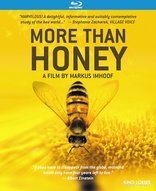
Price
List price:Amazon: $26.72 (Save 24%)
Third party: $26.72 (Save 24%)
Only 1 left in stock (more on the way).
Movie rating
6.9 | / 10 |
Blu-ray rating
| Users | 0.0 | |
| Reviewer | 4.0 | |
| Overall | 4.0 |
Overview
More Than Honey (2012)
Oscar-nominated director Markus Imhoof (THE BOAT IS FULL) tackles the vexing issue of why bees, worldwide, are facing extinction. With the tenacity of a man out to solve a world-class mystery, he investigates this global phenomenon from California to Switzerland, China and Australia. Exquisite macro-photography of the bees (reminiscent of MICROCOSMOS), in flight and in their hives, reveals a fascinating and complex world in crisis.
Starring: Robert Hunger-Bühler, Fred Jaggi, Randolf Menzel, John Miller (XCV), Liane SingerDirector: Markus Imhoof
| Documentary | 100% |
Specifications
Video
Video codec: MPEG-4 AVC
Video resolution: 1080p
Aspect ratio: 1.78:1
Original aspect ratio: 1.78:1
Audio
German: DTS-HD Master Audio 5.1
English: DTS-HD Master Audio 5.1
Subtitles
English
Discs
50GB Blu-ray Disc
Single disc (1 BD)
Playback
Region A (B, C untested)
Review
Rating summary
| Movie | 4.0 | |
| Video | 3.5 | |
| Audio | 4.0 | |
| Extras | 2.5 | |
| Overall | 4.0 |
More Than Honey Blu-ray Movie Review
The Bees' Knees
Reviewed by Casey Broadwater December 20, 2013Maybe you've read news stories about the mysterious recent collapse of honeybee colonies, a near-worldwide phenomenon that had—and to some
extent, still has—scientists and researchers perplexed. And perhaps you've heard the most likely apocryphal quote attributed to Albert Einstein: "If the
bees ever die out, mankind will die out four years later." You've probably taken both with a grain of salt and went on with your day. Bees are not, for
most, a hot-button issue on the scale of, say, global warming. They sting. You go out of your way to avoid them. You enjoy the amber nectar they
produce, but you don't think much about their busy, productive, and necessary lives.
More Than Honey aims to illuminate just how essential bees are to human flourishing, but also to show how our civilization's success has
imperiled the humble honeybee, putting all of us in danger. The low-key yet ultimately harrowing documentary is the passion project of Swiss filmmaker
Markus Imhoof (Das Boot ist voll), who comes from a multi-generational family of beekeepers and decided to "take to the road to find out why"
bees all around the world are dying en masse. What he discovers is no single answer, but a multitude of ills—"not pesticides, mites, antibiotics, incest, or
stress, but a combination of all those factors"—for which we are largely responsible. But the film isn't merely a laid-on-thick societal guilt trip;
it's more of a love letter to bees, leaving us in awe and appreciative.
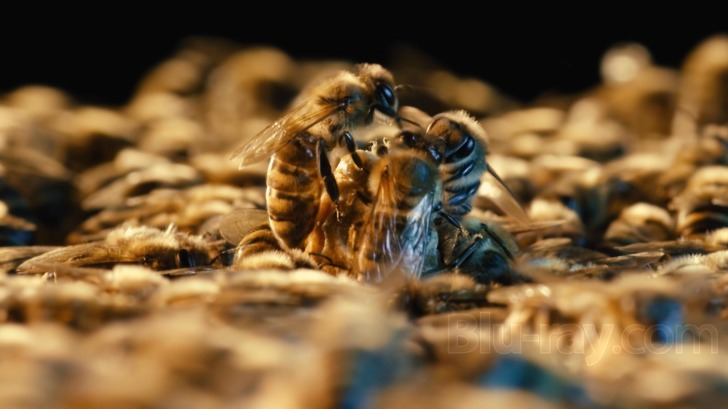
When Imhoof said he wanted to "take to the road," he wasn't kidding; More Than Honey circumnavigates the globe to see how bees are faring far and wide. The director begins in his native Switzerland, where he observes Fred Jaggi, a seventy-something beekeeper of the old school who's almost comically concerned with the "racial purity" of his hives. In one memorable section, he chastises one of his colonies' queens for getting around, basically —she's mated with a different sub-species from outside his valley in the Alps—and then promptly decapitates her with his thumbnail. Later, he has to burn several of his hives after they become infected with foulbrood, a hard-to-eradicate bacterial disease that kills bee larvae. (Note to metal musicians: "Foulbrood" would make a most excellent potential band name.)
In California, we meet John Milller of Miller Honey Farms, an itinerant business that takes hundreds of hives to and fro across the U.S., helping to fertilize industrial almond tree farms in the spring and then harvesting honey in the fall. Imhoof uses this large-scale operation to explain exactly how bees perform the necessary task of pollinating fruit-bearing trees, contrasting this with rural China, where pesticide use has almost entirely wiped out the honeybee in many areas, forcing some farmers to fertilize trees themselves using cotton swabs. Spoiler alert: Bees are much more efficient than the farmers.
Miller is facing his own troubles with Colony Collapse Disorder, the name given to the sudden death of entire hives. "I'm getting real comfortable with death on an epic scale," Miller says when 90 of the 456 colonies he's just transported are found to be dead on arrival. CCD can be caused by a number of factors, and in the case of Miller's bees, it's likely a combination of stress—it's not easy on the hives to be cooped up for two days at a time in an 18- wheeler—and the potent fungicides that farmers use on their trees, both causing weakened immune systems. His bees, like all commercial bees throughout North America, Europe, and China, are kept alive with regular feedings of sugar water mixed with antibiotics. "We've lost our relationship with the hives," Miller says, admitting that his grandfather—who started the business—would be disturbed by the practices of modern industrial beekeeping.
The film throws some scary statistics at us, and the situation is certainly dire—considering that some 80% of plant species rely on our rapidly disappearing bees for pollination—but More Than Honey is more than honeycombed doom and gloom. Imhoof spends a significant amount of time covering the fascinating research being done on bees today. He shows us a map of a bee's neural pathways and observes a pair of scientists who study bees' capacity for ordered decision-making and complex communication. (The well-documented "waggle-dance" plays in here.) He also follows a team of scientists to a remote, uninhabited island off the coast of Australia, where new breeds of disease-resistant bees are being tested. The necessity of isolation for these kinds of tests was learned the hard way in 1957, when a beekeeper for biologist Warwick E. Kerr accidentally released a strain of "Africanized" European honeybees into the wild, leading to the eventual northward migration of what are colloquially called "killer bees." With their tendency to swarm, killer bees are tough to "domesticate" for honey-making purposes, though Imhoof does interview one beekeeper in New Mexico who's made a fairly successful go of it.
Beyond the wake-up-and-smell-the-foulbrood call to awareness, More Than Honey is simply a gorgeously made documentary. Shooting digitally with macro lenses, Imhoof gets some insane closeup, slow-motion footage of bees hard at work—harvesting pollen, feeding the hive's larvae, mating in mid-air. It's jaw-dropping stuff, and it might make you pause next summer and rethink swatting that bee that's flitting around your picnic table.
More Than Honey Blu-ray Movie, Video Quality 
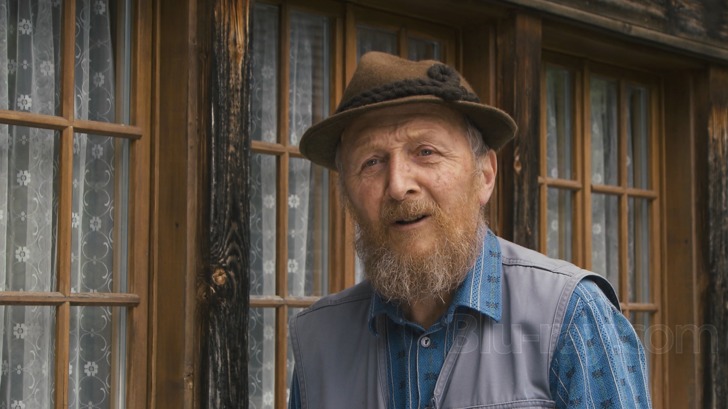
From a normal viewing distance, More Than Honey looks fantastic on Blu-ray, but there are a few noticeable compression issues that crop up if you take a closer look at the 1080p/AVC-encoded image. Banding is visible in many shots with fine color gradients—particularly anytime the camera is angled towards the sky—and noise is quite heavy at times. That said, I'm almost 100% positive that these nitpicks are inherent in the source material and not a product of Kino-Lorber's authoring process. From the behind-the-scenes footage you can see that a lot of the hive close-ups were shot using the Red One camera, and these look fantastic, with rich detail and color. Most of the "in the field" footage, however, appears to have been shot with a digital camera of lesser quality. Sharpness is impeccable in closeups, but many longer shots seem a little soft. Likewise, the color grading is realistic but a weak, and could perhaps use some additional contrast. Nonetheless, this is a beautiful documentary with some truly stunning images that are best seen in high definition.
More Than Honey Blu-ray Movie, Audio Quality 
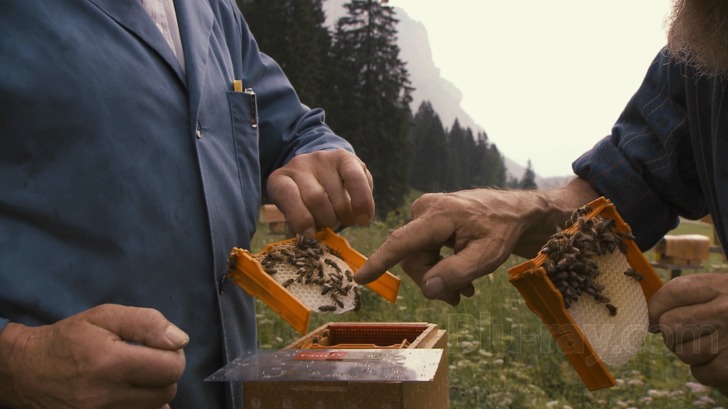
Kino-Lorber has given us two audio options, a mix with the original German-language narration, from Swiss actor Robert Hunger-Bühler, and one with an English voiceover from the venerable John Hurt. Both are presented in lossless DTS-HD Master Audio 5.1 surround tracks, and for a documentary, the sound design here is excellent. Bees buzz and swarm in all directions, giving the rear channels plenty to do throughout. ("Do you hear that?" John Miller asks once, "That's the sound of money.") Both the narration and the interview material are clear and balanced in the mix, and there are no distractions whatsoever. Do note that there are two separate English subtitle tracks, one which times up with the German mix and another that matches John Hurt's craggy narration.
More Than Honey Blu-ray Movie, Special Features and Extras 
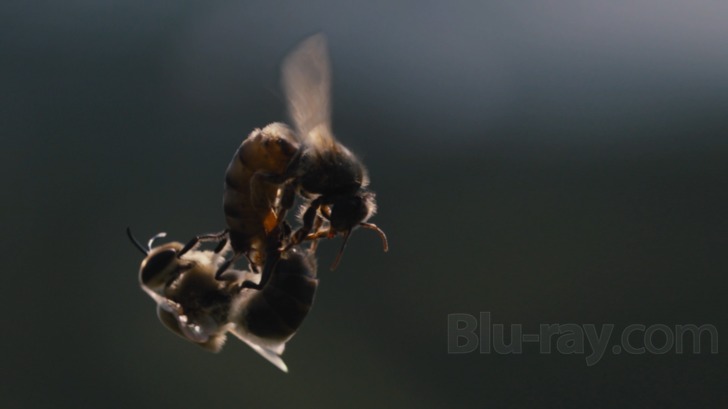
- Markus Imhoof Interview (HD, 20:02): The film's writer/director/producer discusses his family's history in bees, why he decided to make a documentary, and the intense editing process, whittling down 500 hours of footage.
- Deleted Scenes (HD): Includes "Bees in a Glass House" (3:22), "Artificial Hive" (3:45), "Bees on the Road" (4:03), "Pesticides and Brain" (8:36), "Queens via Priority Mail" (4:16), "Indian Bee Osmia" (3:22), and "The So-Called 'Killer-Bees'" (5:51).
- Flight Into the Beehive (HD, 1:59): A short behind-the-scenes pieces showing how some of the insane macro photography was accomplished.
- In the Mountain Cave (HD, 3:06): Likewise, a look at the filming of some of the scenes in New Mexico.
- Trailers (HD, 2:24 and 2:14): Includes both the German and English trailers.
- Image Gallery (HD, 8:32): A self-playing gallery with images from all of the film's locations.
More Than Honey Blu-ray Movie, Overall Score and Recommendation 
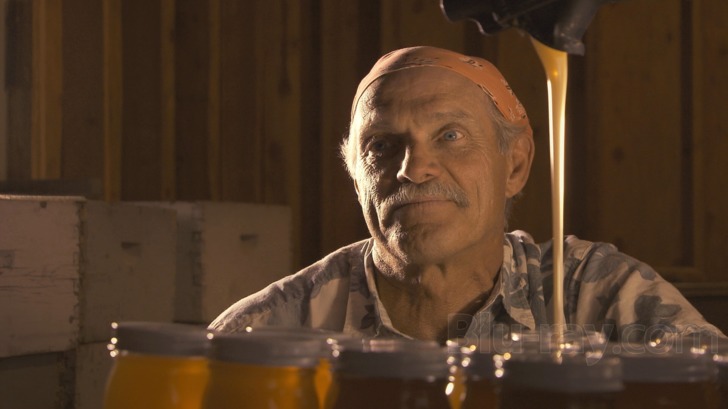
It's not quite as poetic, and doesn't aim for the profound, but More Than Honey feels like the sort of film Werner Herzog would make if he went through a bee-obsessed phase. It's beautifully shot, thoughtfully narrated, and more importantly, it raises awareness about the current plight of the honey bee, which has been disappearing worldwide because of stress and pesticides and a whole range of other environmental factors. Who knew bees were so fascinating? Kino-Lorber's Blu-ray release is pretty sweet too, with a number of extras, including an exclusive interview with director Markus Imhoof. Highly recommended!
Similar titles
Similar titles you might also like
(Still not reliable for this title)

Amazing Grace
Aretha Franklin
2018

Samsara
2011

This Is Cinerama
Deluxe Edition
1952

The Queen
1968

The Gleaners and I
Les glaneurs et la glaneuse
2000

In Search of the Last Action Heroes
2019

The Late Great Planet Earth
1979

Studio 54: The Documentary
2018

RBG
2018

Pandas 4K
2018

I Am Not Your Negro
2016

Meru
2015

Tim's Vermeer
2013

A Place at the Table
2012

Why We Fight
2005

Forks Over Knives
2010

Stephen Fry in America
2007

American Experience: Freedom Riders
2011

A Beautiful Planet 4K
IMAX Enhanced
2016

Cinerama: Seven Wonders of the World
1956